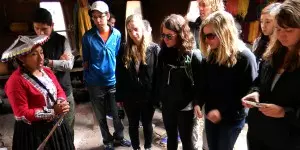The Plight Of Indigenous Languages: How Quechua Opened My Eyes


I was sitting in class, anxiously awaiting its end so I could throw my books in my bag, sprint to the nearest combi, and scarf down a plate of my host mom’s delicious food before going out. Perhaps it was because I was already distracted that I was so thrown off guard when my professor said something surprising.
You would have thought by then that nothing could faze me; having already spent several months in a bustling city that never ceased to amaze me, perhaps the most jarring thing that could happen would be to have an entirely mundane day. Between the park swarming with cats, salsa dancing in the square, the archeological sites dotting the city, the fountain park and more, there was no excuse to be bored – there was always something new that demanded exploring. So when my professor began to explain the Quechuan concept of time to the class, I knew that it was a concept worth considering. In Quechua, he explained, the past is in front of you, because you can see it, and the future exists as being behind you, as there’s no way to know what’s yet to come.
I let this ferment in my mind long after the class had ended, which I left not with the nervous energy I had harbored for much of the latter half of it, but slowly. With even, deliberate steps I made my way to the university’s gate, contemplating the significance of this new bit of information. In a way, it made perfect sense, arguably much more so than the Western perception of time. As I strode out into the street, I began to feel a new appreciation for the possibilities surrounding me. Here I was, in this strange and fantastic new place, home to multiple cultures with different worldviews, yet I had never stopped to consider how I might allow this experience to change my own perspective. I had certainly become a more independent and self-motivated individual, that much is true, but the change went much deeper than that; the longer I stayed in Lima, the more in-touch I felt with the city and the people that reside within it. When I had first arrived in the country, I felt foreign, yet after five months in Lima, I found myself feeling very much at home and quite unwilling to leave.
When I boarded my flight back to the U.S., I found myself with a renewed interest in and passion for indigenous language. As cliché as it may sound, I feel that a part of me never quite left my beautiful neighborhood of Miraflores – at the very least, there was a seed of an idea planted in my mind. I had read all of the horrifying statistics regarding the amount of languages dying out in the world and the conditions under which members of many indigenous communities lived, but to see it for myself in Peru was another experience entirely. Even with Quechua being considered one of the more “stable” indigenous languages of South America (if there even is such a thing), there was still a very visible social distance between indigenous Quechua speakers and the rest of the country. I saw the poverty in which many Quechua speakers lived and read about how some were reluctant to pass on their native language to their children for fear of persecution at school and in the work force. I saw the predominance of indigenous domestic workers and their underrepresentation in so many other work sectors while reading about the lack of medical services being available in Quechua, which now shows signs of improving. For me, this meant bridging the gap between what I’d learned in class and how this knowledge manifests itself in the real world, and it was as jarring as it was absolutely necessary in fueling my desire to work with endangered language in some capacity.
I carry this experience with me even today, a couple of years later. I’m still interested in indigenous language, rights, and policy; in fact, the focus of my capstone paper was indigenous education in Brazil. I consider all that I’ve learned, including that little tidbit I shared from my Quechua class, and realize that we have a lot to lose by ignoring the plight of indigenous languages and their associated cultures. I still hope to return one day and immerse myself once more in all of the strange and unique characteristics that make the country itself so fascinating, and perhaps discover yet more reasons to fall in love with Peru. And although I may not know what lies behind me, I can still take the experiences I’ve had abroad and use them to nurture my passion and work to build a better, richer, and more fulfilling future for myself than I ever could have imagined otherwise.
Courtney S. | Tulane University | Pontificia Universidad Católica del Perú Partnership in Lima, Peru